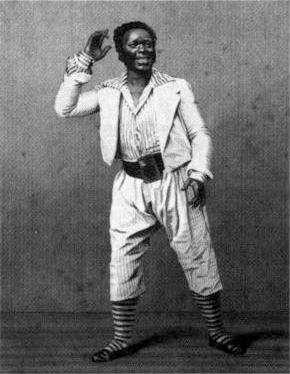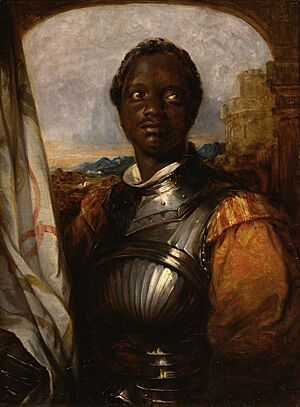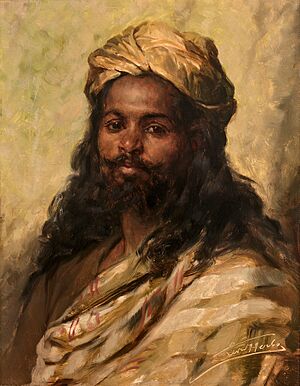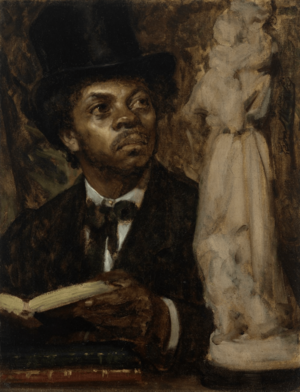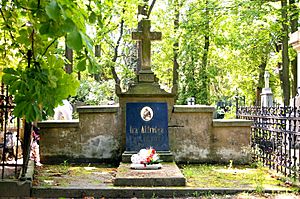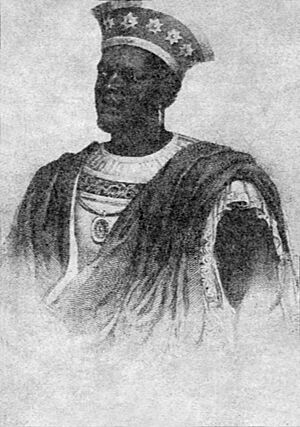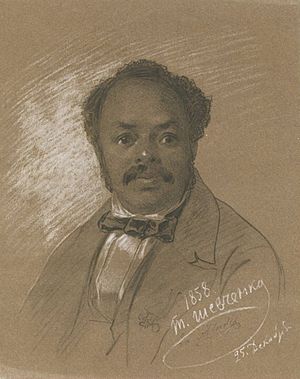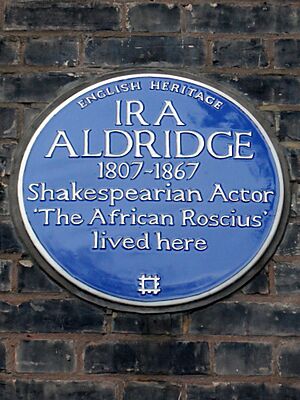Ira Aldridge facts for kids
Quick facts for kids
Ira Aldridge
|
|
|---|---|
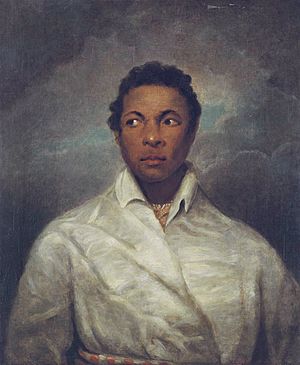
Portrait of Aldridge by James Northcote, 1826
|
|
| Born | July 24, 1807 New York City, United States
|
| Died | August 7, 1867 (aged 60) Łódź, Poland
|
| Burial place | Old Łódź Cemetery, Poland |
| Citizenship | United States, United Kingdom |
| Occupation | Actor, playwright |
| Years active | 1820s–1867 |
| Spouse(s) | Margaret Gill, Amanda von Brandt |
| Children | Ira Daniel, Amanda, Ira Frederick, Luranah, Rachael |
Ira Frederick Aldridge (born July 24, 1807 – died August 7, 1867) was an amazing actor, playwright, and theatre manager. He was born in America but became famous in Britain. He was especially known for playing characters in Shakespeare's plays. Ira Aldridge and James Hewlett are seen as the first Black American actors to perform serious, dramatic roles.
Aldridge was born in New York City. He started acting professionally in the early 1820s with a group called the African Grove Theatre. Because of unfair treatment and discrimination against Black actors in America, he moved to England in 1824. He made his first big appearance at London's Royal Coburg Theatre. As he became more famous, his performances of Shakespeare's plays received great praise. He even became the manager of the Theatre Royal in Coventry. From 1852, Aldridge regularly toured across Continental Europe. He received top awards from several leaders of countries. He died suddenly while on tour in Poland and is buried in Łódź.
Aldridge is the only actor of Black-American heritage to be honored with a special bronze plaque at the Shakespeare Memorial Theatre in Stratford-upon-Avon. Two of Aldridge's daughters, Amanda and Luranah, grew up to become professional opera singers.
Contents
Early Life and Career
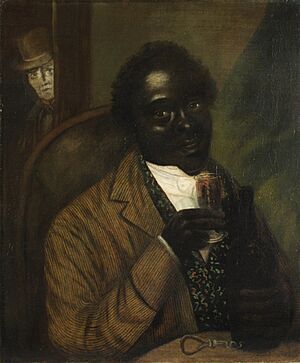
Ira Aldridge was born in New York City on July 24, 1807. His parents were Reverend Daniel and Luranah Aldridge. When he was 13, Aldridge went to the African Free School in New York City. This school was started by the New York Manumission Society for children of free Black people and slaves. Students there received a good education, learning English, writing, math, geography, and astronomy. Some of his famous classmates included James McCune Smith and Henry H. Garnet.
Aldridge's first acting experience was in the early 1820s with the African Company. This group was founded by William Henry Brown and James Hewlett. In 1821, the group built the African Grove Theatre, which was the first theatre in the United States specifically for African-American performers. This company didn't last long because of protests and unfair treatment. It became clear that it would be very hard for Aldridge to have a successful acting career in America. Aldridge first acted as Rolla in Pizarro. He might have also played the main male role in Romeo and Juliet.
Because Black actors faced so much discrimination in the United States, Aldridge moved to Liverpool, England, in 1824. At this time, the Industrial Revolution was changing England, and the British Parliament had already made the slave trade illegal. They were also working to end slavery across the British Empire. This made England a more welcoming place for Black actors like Aldridge.
When he first arrived, Aldridge didn't have much acting experience or fame. To gain attention, he sometimes claimed to be from an African royal family. He also temporarily used the name Keene, similar to a famous British actor named Edmund Kean. This was a common trick in theatre to get noticed. People later called him "African Roscius" after a famous Roman actor.
In May 1825, at age 17, Aldridge first appeared on the London stage in a small show of Othello. On October 10, 1825, he made a much bigger debut at London's Royal Coburg Theatre. He became the first African-American actor to become a professional performer in a foreign country. He played the main character, Oroonoko, in a play called The Revolt of Surinam, or A Slave's Revenge.
Aldridge started a new tradition early in his career. On the last night of his shows, he would speak directly to the audience. He talked about important social issues in the United States, Europe, and Africa. Most importantly, Aldridge spoke out against slavery, and he was greatly admired for this.
Touring and Later Years
In 1828, Aldridge was touring around England and visited Coventry. The people of Coventry were so impressed by his acting that he was made the manager of Coventry's Theatre Royal. This made him the first ever African American to manage a British theatre!
While in Coventry, Aldridge gave many speeches about how terrible slavery was. After he left, his speeches inspired the people of Coventry to ask the Parliament to end slavery.
In 1831, Aldridge performed successfully in Dublin, Ireland, and in cities like Bath, England, and Edinburgh, Scotland. The famous actor Edmund Kean praised Aldridge's performance as Othello. Because he was a Black actor from the African Theatre, The Times newspaper called him the "African Roscius". Aldridge used this to his advantage, even listing his birthplace as "Africa" in the 1851 census.
By 1833, he had added the role of Zanga in Edward Young's The Revenge to his plays.
Aldridge continued to tour many towns in England during the 1840s, including Gainsborough, Grantham, and Lincoln. In Lincoln, local newspapers reported that his arrival in a fancy coach caused a stir. Even if his performances weren't always packed, he received good reviews. In 1849, the Lincoln Standard newspaper wrote that his talents were "first rate" and that he showed "mankind all have an equal capacity, if they had but the opportunity of receiving instruction."
In 1852, Aldridge began his first tour of continental Europe, starting in Brussels, Belgium. He had great success all over Europe. He was especially popular in Prussia, where he performed for King William IV. He also performed in Budapest. An 1858 tour took him to Serbia and the Russian Empire. There, he met famous people like Count Fyodor Tolstoy and the Ukrainian poet Taras Shevchenko, who drew his portrait.
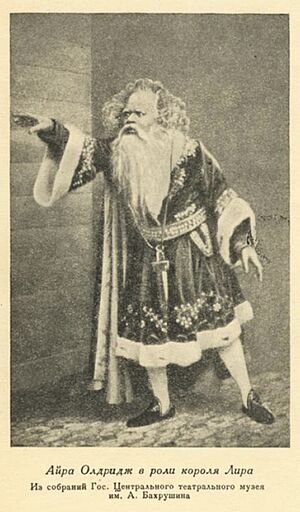
Around this time, he was old enough to play the main role of King Lear for the first time in England. He bought property in England, toured Russia again in 1862, and applied to become a British citizen in 1863. Shortly before he died, he was planning to return to America to perform after the American Civil War. The New York Times reported that he had planned a 100-show tour in the United States.
Marriage and Family
Soon after moving to England, Ira Aldridge married Margaret Gill, an Englishwoman, on November 27, 1825. Their marriage made some people angry, especially those who supported slavery, and they tried to hurt Aldridge's career. The couple was married for 40 years until Margaret's death in 1864.
Aldridge's first son, Ira Daniel, was born in May 1847. Margaret raised Ira Daniel as her own son, and they had a loving relationship. He moved to Australia in 1867.
Aldridge bought a house in Upper Norwood, London, in 1861–62, shortly before becoming a British citizen. He named the house 'Luranah Villa' in memory of his mother. Today, it has a special English Heritage blue plaque.
A year after Margaret's death, on April 20, 1865, Aldridge married Amanda von Brandt (1834-1915). They had four children: Irene Luranah, Ira Frederick, and Amanda Aldridge. The two girls became opera singers. Their daughter Rachael Frederica was born shortly after Aldridge's death but died as a baby.
Aldridge spent most of his later years with his family in Russia and Europe, with occasional visits to England. He planned to return to the United States after the American Civil War. After finishing a tour of France and Belgium in 1867, Aldridge died on August 7, 1867, while visiting Łódź, in Poland. He was buried in the city's Old Evangelical Cemetery. His grave is cared for by a Polish theatre group. In 2014, a special plaque was put up at 175 Piotrkowska Street, where Aldridge is believed to have died.
A portrait of Aldridge from 1826, showing him dressed as Othello, is on display at the Manchester Art Gallery. Aldridge performed in Manchester many times. A blue plaque was put up in 2007 at 5 Hamlet Road in Upper Norwood, London, to remember Aldridge. The plaque calls him the "African Roscius".
Ira Aldridge Troupe
Ira Aldridge was very famous as a dramatic actor during his lifetime, but after he died, he was quickly forgotten in Europe. News of his death reached the American Black community slowly. For African Americans, Aldridge was a legendary figure. Many Black actors looked up to him. When his death became known, several amateur acting groups honored him by naming their companies after him.
Many such groups were formed across America. In the late 1800s, Aldridge-named troupes were started in Washington, D.C., Philadelphia, and New Haven.
The most well-known group named after him was the Ira Aldridge Troupe in Philadelphia, started in 1863. This group was a minstrelsy group that made fun of Irish men. The Ira Aldridge Troupe was special because it was named after a Black actor who had left his home country many years before and become famous in Europe. Unlike most later Black minstrel companies, this troupe didn't seem to perform acts about plantations. They were even called a 'contraband troupe,' meaning fugitive slaves. They often performed for Black audiences.
The Ira Aldridge Troupe performed during the American Civil War, which made them unique. They performed for mixed audiences, at a time when white and Black audiences were often separated. Also, it was a Black troupe creating shows that appealed to their Black audience. They avoided old "darkies" longing for the plantation, which was common in other minstrel shows.
The troupe also created performances and songs about the ongoing Civil War. A song called "When the Cruel War is Over" became very popular. It was performed by three members of the troupe and sold over a million copies of sheet music. The song was about a soldier saying goodbye to his love, getting hurt in battle, and his dying wish for a last hug. This song was also popular with white minstrel groups, showing how minstrelsy was changing.
The history of minstrelsy shows how cultures influenced each other, with White performers adopting parts of Black culture. The Ira Aldridge Troupe tried to take back some of that influence and use minstrelsy for their own purposes, working with their audience.
Aldridge Family
- Ira Daniel Aldridge, 1847–?. Teacher. Moved to Australia in 1867.
- Irene Luranah Pauline Aldridge, 1860–1932. Opera singer.
- Ira Frederick Olaff Aldridge, 1862–1886. Musician and composer.
- Amanda Christina Elizabeth Aldridge (Amanda Ira Aldridge), 1866–1956. Opera singer, teacher, and composer (under the name Montague Ring).
- Rachael Margaret Frederika Aldridge, born 1868; died as a baby in 1869.
Legacy and Honors
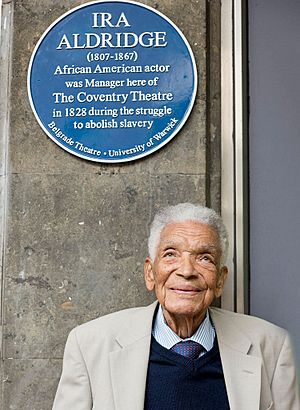
- Aldridge received awards from European leaders for his acting. These included the Prussian Gold Medal for Arts and Sciences from King Frederick William III, the Golden Cross of Leopold from the Czar of Russia, and the Maltese Cross from Bern, Switzerland.
- During his successful tours, Aldridge had the special honor of performing for many kings, queens, princes, and other important leaders.
- Aldridge is the only African American to have a bronze plaque among the 33 actors honored at the Shakespeare Memorial Theatre at Stratford-upon-Avon.
- A statue of Ira Aldridge by Pietro Calvi is in the Grand Saloon of the Theatre Royal Drury Lane in London.
- Aldridge's life inspired the writing of African-American playwright Henry Francis Downing.
- In 2002, scholar Molefi Kete Asante included Ira Aldridge in his book 100 Greatest African Americans.
- His life was the subject of a play called Red Velvet by Lolita Chakrabarti, starring Adrian Lester. It was performed in London in 2012.
- Howard University in Washington, D.C., a historically black university, has a theatre named after Ira Aldridge.
- Aldridge's performance as Othello greatly influenced other African-American actors who played Othello in the 1800s and early 1900s, such as Paul Robeson.
- A blue plaque honoring Aldridge was put up in Coventry, England, on August 3, 2017. Professor Tony Howard, who teaches at the University of Warwick, worked to get this plaque. He said that Aldridge "changed the climate of thinking" about the abolition of slavery in Coventry. The plaque was unveiled by the Lord Mayor of Coventry and actor Earl Cameron, whose voice coach was Aldridge's daughter, Amanda Ira Aldridge.
- Another blue plaque was put up in 2007 by English Heritage at 5 Hamlet Road, Upper Norwood, London.
The Black Doctor (1847)
The Black Doctor was originally a French play that Aldridge changed for the English stage. It's a romantic play about Fabian, a doctor of mixed race, and his patient Pauline, who is the daughter of a French noble. They fall in love and marry secretly. Even though the play shows racial and family problems and ends with Fabian's death, Aldridge was praised for playing his character with great dignity.
See also
 In Spanish: Ira Aldridge para niños
In Spanish: Ira Aldridge para niños
- The Captive Slave
 | Bessie Coleman |
 | Spann Watson |
 | Jill E. Brown |
 | Sherman W. White |


